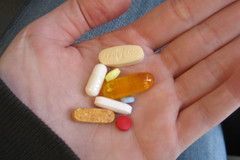High Doses of Vitamin B prove Harmful to Diabetics with Kidney Failure

TORONTO - Diabetics with impaired kidneys should avoid taking high doses of certain B vitamins because the supplements may do serious harm, researchers say.
In a study of 238 diabetics with failing kidneys, researchers found that those taking high doses of folic acid, B6 and B12 had increased renal damage and double the risk of heart attacks and strokes compared to those given dummy pills.
People with kidney failure shouldn't be taking high doses of these water-soluble vitamins, like the B vitamins, said principal investigator Dr. David Spence of the University of Western Ontario's Robarts Research Institute.
More than three million Canadians have diabetes, and about 40 per cent will eventually develop kidney disease.
Previous research has suggested that B vitamins can lower levels of a blood-clotting substance called homocysteine. High concentrations of this amino acid are known to harm the lining of arteries, bumping up the risk of kidney damage, heart attack and stroke - all complications of poorly controlled diabetes.
So we thought that lowering homocysteine with vitamins ought to slow down the rate of decline of kidney function in diabetics with kidney damage and maybe also reduce the risk of strokes and heart attacks, Spence said from London, Ont.
To conduct the study, subjects were randomly assigned to receive either the vitamins or a placebo.
He discovered that the vitamin-treated group's kidney function worsened more rapidly and that they had more strokes and heart attacks than the placebo group. He described such findings as astonishing.
In their paper, the authors suggest a number of possible reasons. One strong possibility relates to the fact that water-soluble B vitamins are normally washed from the body via the urine after being filtered through the kidneys.
It may be that people with kidney failure can't get rid of the vitamins (and they) build up toxic levels, Spence said, noting that B vitamin therapy in people without failing kidneys has been shown to reduce heart attack and stroke rates.
So I think what that's telling us is that (these) vitamins are beneficial for people with normal kidney function and harmful for people with poor kidney function.
The doses used in the study were many times higher than the amounts of folic acid, B6 and B12 found in a typical multivitamin, said Spence, but elevated doses are often prescribed by doctors or self-prescribed by patients themselves.
He suggested the study's findings provide a cautionary note about vitamins in general, which can be harmful if taken in high quantities. Taking too much D, a fat-soluble vitamin, can lead to kidney stones, as can excess ingestion of water-soluble vitamin C; high doses of fat-soluble vitamin A can be toxic.
jc





















